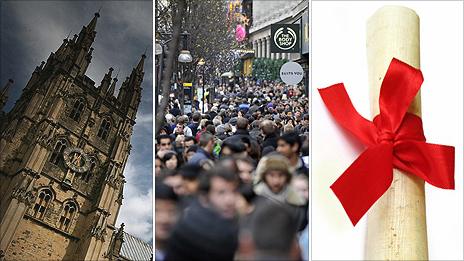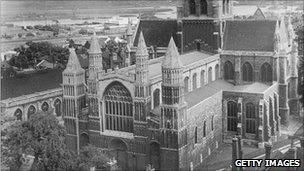Why do towns want to become cities?
- Published
- comments

More than 20 towns across the UK have applied to become a "city", a status that confers no official benefits. So why would anywhere bother applying?
It would make a great pub quiz question. Which of these places is not a city - Dudley, Dundee or St Davids?
The answer is Dudley town, with a population of 195,000.
Dundee, with 143,000 residents, became a city in 1889. And St Davids is the UK's smallest city with 1,600 inhabitants, having earned its honour in 1995.
Most people think they know what a city is - a large, densely-populated, distinct urban area. And a lovely old cathedral is a must.
But when it comes to the UK's official city status, the cathedral requirement is long defunct, ending in the 19th Century. And size does not matter.
The bounds of city status throw up a plethora of quirks.
There aren't too many people who would deny that London was a city but in the UK it is not an official one, although it contains two of them - the City of London and City of Westminster.
A place can also stop being a city overnight. Rochester lost its city status in 1998 due to a technical oversight when the local government structure was reorganised. It took four years for them to realise they had lost it.
The definition of a city in the UK is a place which has been granted city status by the monarch. There are 66 cities in the UK - 50 in England, five in Wales, six in Scotland and five in Northern Ireland.
A new city will be created next year for the Queen's Diamond Jubilee, and 25 towns across the UK have thrown their hat into the ring.
The contestants come in a range of shape and sizes, from the Greater Manchester towns of Bolton and Stockport and the London Borough of Tower Hamlets, to the new town of Craigavon in Northern Ireland and the small Welsh cathedral town of St Asaph.
Although the 2012 contenders were instructed to keep costs down in these budget-conscious times, a lot of effort still goes into the bid, with each local authority submitting 25 pages of information and 25 pages of photographs.
When the winner is announced early next year, what can the newest city in the UK expect in return?
They certainly won't get any tax breaks or extra powers or a pretty new square.
Prof John Beckett, who has written a book on the subject, says it has always been a "status thing".
"There never has been any privileges. It's always been a status thing, nothing more. There's nothing to stop places declaring themselves a city - Dunfermline did it."
He says the whole system "makes no sense" and it just "gives a bit of patronage to government".
But Dr Steve Musson, from the University of Reading, has been researching the economic impact of city status on the UK's eight newest cities. Preston, Newport, Stirling, Lisburn and Newry were made cities in 2002, while Brighton & Hove, Wolverhampton and Inverness gained the status in 2000.
Although the whole of the UK was enjoying an economic boom, the new cities, with the exception of Wolverhampton, outperformed their regional counterparts in terms of increasing investment and reducing unemployment.
"The other advantages, less easy to quantify, are the international exposure and the buzz created. There is an element of pride about becoming a city."
Selling point
Stephen Parkinson led Preston's £30,000 bid in 2002 and he says it put Preston "on the map". He says Preston is now one of the top five areas in the country for private sector growth.
"We have been able to do it, not though city status alone, but because of a wide range of factors. We have good transport links and a skilled workforce.
"It was a unique selling point when talking to developers and investors. We were the 50th city in England and we have joined an elite club. You are recognised internationally and nationally as a place that means business."
Dr Musson says the average bid for the 2012 competition will have cost about £10,000 and for some it will be their third or fourth attempt.
Swindon was one of the local authorities to pull out, saying it was better to tackle other issues and not chase titles in the current economic climate.
Ipswich has tried and failed three times to become a city and it also chose not risk it again, much to the relief of Ipswich Town Football Club. The Town, as the team is known, had been an issue during the previous city status bids.
"Ipswich City sounds stupid," says Ipswich fan Tim Edwards. "ICFC is horrible. It sounds like a DIY store."
He says he wouldn't want city status, even if it meant catching up with their biggest rivals Norwich City.
"Norwich has four things they can lord over us - a cathedral, an airport, it's a city and they are in the Premier League. We are only bothered about the Premier League and we are confident that won't last for long."
Jealously guarded
While some people really don't care if they wake up each morning in a town or city, others feel there is a principle at stake and are bitterly aggrieved if their city is downgraded in a newspaper or television report.
Like many of the 2012 contenders, Perth believes it is already a city. The town has an ancient history and was the capital of Scotland up until 1437.
Perth and Kinross Provost Dr John Hulbert, who led the bid, says Perth has always been a city to its people and "they guard it jealously".

Rochester Cathedral in 1949, when it was still a city
"But it's important that we have this official cache," he adds.
He says aside from civic pride, it was important for the local authority to have city status because the Scottish government is developing a range of new initiatives around the country's cities.
Dr Hulbert hopes the Queen's love of Scotland may work in Perth's favour.
But Prof Beckett, author of City Status in the British Isles 1830-2002, says the Queen's role is to rubber-stamp a ministerial decision.
He says British cities have always need some kind of Royal approval and, from before the time of the Norman Invasion, a place had to have a cathedral.
The "logic was starting to look a bit fragile" when Truro and St Albans were cities but big industrial places like Belfast and Birmingham were not.
Population was a big factor in the decision to award city status from the 1900s and the unofficial figure was 300,000, he says, but the rule would be broken if a place had a link with the Royal family, a major event or a political ambition.
The bookies favourite for the 2012 contest is Reading. It boasts good royal connections - Windsor is just down the road and Catherine, the newest member of the Royal Family, was born in Berkshire.
Oh, and it has 213,000 people. But no cathedral.